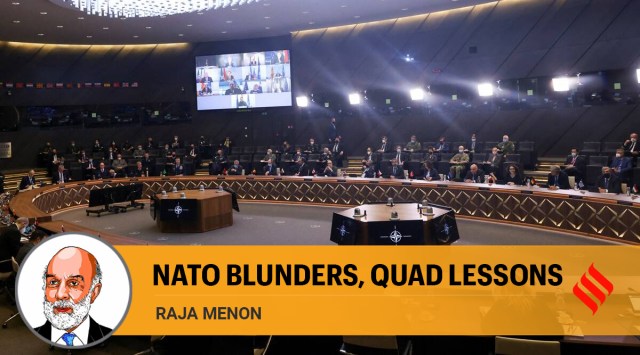
Wars produce much retrospective literature, and even World War I continues to produce fresh narratives, raising never before addressed issues. Perhaps we are too close to the events of the Russo-Ukraine war to produce a truly dispassionate account of the events that built up to the invasion. Of course, Vladimir Putin imprisons anyone who calls the invasion a war. His version is that it was a “special military operation”, akin to India’s police action against Hyderabad in 1948. This article is admittedly written in hindsight, but there is a continuing thread to the western blunders in the approach to dealing with Moscow, particularly concerning Putin. He has had a dramatic rise in the political hierarchy of Moscow, with many of his successes unexplained but for the strong behind-the-scenes backing of the FSB. What should have brought Putin to the notice of the West were his first two achievements — the stabilisation and increase in oil production and export that hugely increased the Russian GDP, and secondly, his successful suppression of the Chechnya revolt. These were clearly the achievements of a man with a vision for Russia. Unfortunately, it was ignored in the West, and particularly in Europe, which was busy with civilianising and militarily downgrading NATO.
It is understandable that as economic prosperity grew in Europe and Eastern European nations clamoured to join the EU, the western leaders were overcome with hubris and dismantled the military intellectual content of NATO headquarters, reducing NATO forces to a rapid reaction force under the political control of a civilian secretary-general. The West, therefore, failed to connect Putin’s invasion of Georgia with his continuing vision to fight the regime change in Ukraine in 2015. Instead, they actually made overtures to Volodymyr Zelenskyy to cosy up to a toothless NATO. The most ridiculous political performance of the first day of the Russian invasion will remain the ineffectual address by Stoltenberg, the civilian secretary-general of NATO warning Russia of “consequences”. There is no doubt that Russia will eventually withdraw from some conquered territory and also that Moscow and the Russian people will suffer financial consequences but a big question will remain: What is the cardinal error made by NATO? That will remain the civilianising of NATO when confronted with Putin’s vision of a greater Russia.
What can the Quad learn from this unnecessary war? The Indo-Pacific is not continental Europe. War in the Indo-Pacific will be a maritime war fought in accordance with maritime strategy and space assets. The rules of engagement are vastly different. The greatest difference is that peaceful maritime reconnaissance is a legitimate activity with the help of which situational awareness can be built up, enabling the delivery of a crippling conventional first strike in the first stages of a possible conflict. To call the Quad a “diplomatic grouping” is a catastrophic error. The visiting US C-in-C Pacific Command, Admiral Samuel John Paparo made almost an apology when he explained in Visakhapatnam that “strategy follows policy” and hence the Quad would be a diplomatic grouping, thereby going down the same erroneous route as NATO.
The big question is: Why is the Quad appeasing Beijing? In actual fact, the Quad, as Admiral Paparo admitted, is all about maritime domain awareness, underwater domain awareness, and information sharing — all of them purely naval activities, which need continuous communication (that is catered for), a command organisation and a secretariat, neither of which we have because Quad is a diplomatic grouping. The military is trained to think structurally, cast future scenarios, do contingent planning, find alternatives and plan for victory. Diplomats have no such background, and the one person the West really misses today is Andrew Marshal, the originator of Net Assessment, who would certainly have foretold the rise of a dangerous and embittered Russia. Each member of the Quad has a different enmity with China. India sees it as an obstructionist, aggressive, land grabbing competitor, the US sees it as an ideological and hegemonistic competitor, Japan and Australia are ideological allies of the US. What binds these nations is their determination to dominate the Indo-Pacific and use maritime power to enforce the rules of governance. Confusing Beijing by calling it a diplomatic grouping will certainly lead to a misunderstanding of the Quad nations’ resolve and possible Chinese adventurism. The Quad needs to be represented by the owners of the maritime assets used to obtain domain awareness and a staff with command communications and a depth of intellectual planning. Putin and Xi Jinping have both bulldozed their constitutions to lengthen their tenures to implement their vision, Putin for Russia and Xi for the world.
The great maritime strength of the Quad is its force of Maritime Patrol Aircraft. Japan and the US are particularly rich in those resources. India’s force of P-81s is substantial and with the help of Australia, a maritime domain awareness can be built up that denies the PLA navy the chance to hide in the vastness of the ocean. The Indo-US communication agreement was presumably established to keep the four-nation search group on a common grid. It would be useful to establish an Indo-Pacific situation plot at Visakhapatnam, backed by an elite naval staff, to watch the transformation of China from a regional power into a world-class navy. Quad meetings should be headed by naval officers, with diplomatic support, so that they don’t produce irrelevant communiqués like the one in February 2022 that spoke of dealing with Covid, climate change and natural disasters.
This column first appeared in the print edition on March 18, 2022 under the title ‘NATO blunders, Quad lessons’. The writer, a former rear admiral in the navy, is author of A Nuclear Strategy for India.